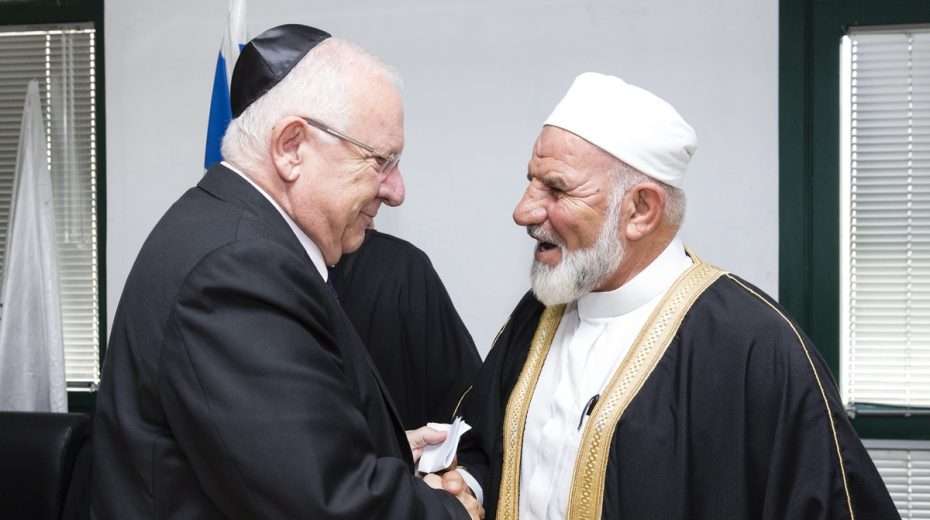In 1948 when the British mandate ended in this land, the newborn Jewish state suddenly found itself responsible for a minority Arab population of around 15% of the overall population living under its direct sovereignty (not including Gaza and the “West Bank,” whose Arabs were not and still are not under direct Israeli sovereignty).
Israel Today has reported before regarding these citizens living amidst the Jewish majority. Even in the face of massive Jewish influx (aliyah) to Israel over the last 75 years, the Arab population has blossomed, to number about 2 million today, 20% of the Israeli citizenship.
Palestinian propaganda campaigns pump their negative narrative into mainstream news outlets, accusing Israel of discrimination and apartheid.
A big part of why Israel Today exists is to bring a counterweight and raise a clarifying voice in the worldwide “marketplace of ideas” (or battleground of ideas, as the case may be).
Israeli Arabs. By definition, it would be hard to find a group who could be more impartial in appraising the actual effect of the Jewish state on local Arabs, than they themselves. “Straight from the horse’s mouth” as the expression goes. We have written on similar themes before.
So, it aroused our curiosity when we saw the title of the just-released video interview composite “Arab-Israelis: Where Would You Rather Live?” on the popular American media outlet PragerU.
The questions and answers demonstrated again that in normal Israeli day-to-day life, a remarkable coexistence is the rule rather than the exception.
Here are some highlights of the various Arab-Israeli citizens’ responses:
Question: What is life like for an Arab living in Israel? Can you go anywhere you want?
Arab-Israeli citizens respond, including a woman in black Islamic garb and hijab:
- “We live in a country that gives us many things – from the perspective of the laws, benefits and everything else. It is the best. In comparison to other countries, it is really good. We have a great time. I study. I work. I enjoy life. I take trips, all kinds of things.”
- “There are problems, but the whole world has problems, not just the Israelis and Palestinians. But those who look for the problems find them… There are bad things about the Arabs, too. Not just the Israelis. They also kill each other for stupid reasons.”
- “We live a regular life in Israel, like anywhere else in the world. Regular life, we have income. We have everything…”
- “I’ve been working with them [Israeli Jews] for many years. Never have I ever had a problem.”
The only person who was negative was an Arab-Israeli woman who is studying to become a lawyer. She complained about the high tax rates in Israel and about her Israeli university not cancelling studies on Muslim holidays.
Question: Would you prefer to be a citizen of Palestine? Or a citizen of Israel?
Arab-Israeli citizens respond:
“I prefer to stay here. I was born here in Israel. There is nothing for me there [under the Palestinian Authority]. I have everything here – a home, a family. Everything I have is in Israel.”
Question: Would you prefer this town [Jaljulia] to be part of Palestine? Or would you prefer this town to stay in Israel?
Arab-Israeli citizens respond:
- “In terms of a peace deal, if they swapped this land from Israel to become Palestine… I hope so. I hope so. It’s not that I prefer Palestine. It’s our land. That’s the first thing. My grandmother’s and grandfather’s… I prefer to keep the laws of Israel but to live in Palestine [smiling and amused at the thought] …even though I understand that they don’t go together.”
- “I prefer here in Israel. We have more benefits and more democracy. They don’t have many benefits and no democracy. No, I don’t want to be a Palestinian.”
- “I want to be an Israeli citizen, absolutely.”
Question: Do you think that life for an Arab in Israel is better than life for an Arab in most of the Arab world?
Arab-Israeli citizens respond:
- “Yes. To live in a country where there is democracy is better than living in a dictatorial country.”
- “On Saturday, all kinds of [Jewish] people come to us. We eat together. We drink together. We work together. We are in good contact with each, Jews and Arabs.”
In conclusion: In spite of recently enduring the Holocaust, the Jewish nation is remarkably tolerant and fair with its minorities, perhaps because of hearing the words of the Torah for thousands of years:
“When a foreigner lives with you in your land, do not mistreat him. The foreigner living with you must be treated as one of your native-born. Love him as yourself, for you were foreigners in Egypt. I am the LORD your God.” (Leviticus 19:33-34)
















That’s an important point, the League of Nations gave mandates to the French and British to settle post-Ottoman Syria. Both played the Arabs against each other but were ultimately thwarted by the Arab ability to unite and had to concede territory to them. Young Israel inherited a militant Arab entity that saw Israel as just another foreigner to evict. The French and British left and the Jews found themselves having to fend off Arabs who were trained and armed by empires. Israel won the wars but has struggled to win the peace. Israeli Arabs are better off than Arab Arabs but the PLO has thrown a spanner in the works by being supported by the international community (IC) to compete for democratic approval in Israel by the Arabs. The IC need to make elections mandatory or remove UN status from the PLO.